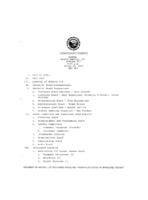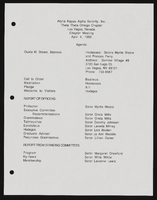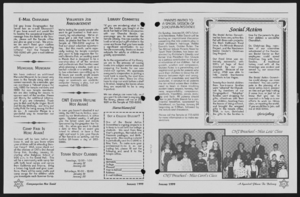Search the Special Collections and Archives Portal
Search Results

Meeting minutes for Consolidated Student Senate, University of Nevada, Las Vegas, March 22, 1983
Date
Archival Collection
Description
Text

Laura Sussman oral history interview: transcript
Date
Archival Collection
Description
Oral history interview with Laura Sussman conducted by Barbara Tabach and Claytee D. White on March 15, 2018 for the Remembering 1 October Oral History Project. In this interview, Laura Sussman, co-owner of Kraft-Sussman Funeral & Cremation Services, discusses the funeral home's role during the aftermath of the October 1, 2017 Las Vegas, Nevada mass shooting. She talks about the collaborated efforts of the funeral home and the coroner's office to care for the deceased, giving some details on the role of a coroner and the specific cases the funeral home was in charge of. Along with the victims, she discusses the potential cremation they were asked to do of the shooter. Throughout the interview, Sussman emphasizes the funeral home's goal of providing support to the families of the deceased.
Text

Alpha Kappa Alpha Sorority, Theta Theta Omega Chapter meeting agendas
Date
Archival Collection
Description
From the Alpha Kappa Alpha Sorority, Incorporated, Theta Theta Omega Chapter Records (MS-01014) -- Chapter records file.
Text

Nery Martinez interview, December 6, 2018: transcript
Date
Description
Interviewed by Laurents Bañuelos-Benitez. Nery Martinez was born in El Salvador, he describes his childhood as one filled with war and violence. When Martinez was five years old, the small country of El Salvador erupted in civil war. Martinez describes the panic that he saw growing up, never being certain when violence could occurred. The 12 year war took up the entirety of Martinez's childhood. After the war, the country was left in runes, seeing little hope for recovery, Martinez left El Salvador for Las Vegas where his brothers had fled earlier during the war. In Las Vegas, Martinez was able to find work in the service industry, at the same time attending English classes at night. Martinez is currently working as a bartender within the Culinary Union. Interview conducted in Spanish.
Text
C. A. Earle Rinker Papers
Identifier
Abstract
The C. A. Earle Rinker Papers (1880-1960) contain materials that document the history of early twentieth century Goldfield, located in central Nevada, as well as the life of Rinker. Materials in the collection include correspondence, mining prospectuses, maps, ledgers, souvenirs, photographic negatives, and ephemera that document mining and daily life. Also included is biographical material that tells the story of Earle Rinker and his family before 1906 and after 1909, documenting his life in Indiana and Illinois.
Archival Collection
UNLV University Libraries Collection on Nevada Mining
Identifier
Abstract
The Nevada Mining Collection is comprised of records that document mining and mines in Nevada from 1842 to 1966. The majority of the collection includes records of various mines and mining companies located in the Esmeralda, Lincoln, Clark, White Pine, and Nye counties, dating from 1900 to 1928. The collection includes financial, administrative, and business related records; photographs of miners, mining camps, and towns; correspondence; maps; newspaper clippings, pamphlets, newsletters, and booklets.
Archival Collection

Stavan Corbett oral history interview: transcript
Date
Archival Collection
Description
Oral history interview with Stavan Corbett conducted by Nathalie Martinez on November 5, 2018 for the Latinx Voices of Southern Nevada Oral History Project. Barbara Tabach and Rodrigo Vazquez also participate in the questioning. Stavan Corbett is a member of the Latino community who has served as an educator and politician in Las Vegas. Growing up in Las Vegas, Stavan was exposed to various environments that all helped him shape his Latino identity. Stavan was able to appreciate the Catholic and Jewish cultures as well. During the 1970s and '80s his experiences with first and second generation Latinos played a large role in his identity formation, especially as a student. He was the first in his family to graduate from high school and college. Stavan worked in the hotel industry and moved on to work with troubled youth and eventually become a member of the Nevada State Board and the Clark County School Board. His continued work with the Latin Chamber of Commerce has also allowed him to be involved with the Latino Youth Leadership Conference. Subjects discussed include: Identity Struggle, Interracial Relationships, Working in the Hotel Industry, Clark County School District, and Cultural Assimilation.
Text

Transcript of interview with Billy Paul Smith by Claytee White, October 3, 2013
Date
Archival Collection
Description
Chemist, mathematician, and health physicist Billy Paul Smith donates time to tutor young people in hopes of attracting more youth into the fields of math and science. Born in 1942 and schooled in segregated black schools in Shreveport, Louisiana, and Texarkana, Texas, he graduated from high school at age fifteen and enrolled at Prairie View A&M University, where he trained with the Reserve Officer Training Corps (ROTC) and earned his Bachelor’s degree in chemistry and in 1964 his Master’s degrees in chemistry and math. Most young U.S. Army officers in 1964 went to Vietnam, but Billy’s math and science background steered him to the Army Chemical Corps, where he was quickly selected to join a new team. The team was to develop responses to nuclear weapon accidents and worked under the Defense Atomic Support Agency (DASA) in Albuquerque, New Mexico. At the same time, Billy completed the Weapons Ordinance Army course on classified information relating to the U.S. nuclear weapons arsenal. In this interview, Billy talks about his service with DASA and his subsequent twenty-seven years working at the Nevada Test Site in a variety of positions with Reynolds Electrical and Engineering Company, Inc. (REECo), a company that had “percentagewise more blacks in management positions than any other [Las Vegas] company.” He experienced the quiet racism of Las Vegas residential segregation when he tried to purchase a house in a neighborhood he liked and the unexpected kindness of the REECo general manager, Ron Keen, who made sure the Smith family could live where they wanted to live. He talks about Area 51 and explains underground testing activity and offers the scientific and ecological reasons why scientists deemed Yucca Mountain safe to store nuclear waste. After retiring at fifty-two, Billy and a colleague formed an independent instrumentation company, which, from 1995–2005 provided and calibrated radiological measurement and detection instruments for the decommissioning and closure of the Rocky Flats nuclear plant in Golden, Colorado. During that time, Billy rented an apartment in Boulder, but he and Jackie maintained their Las Vegas home, where they still reside. Billy shares memories of places he and his wife used to enjoy on the Westside and tells of their longtime friends in the black community. He also talks about developing his philosophy of philanthropy through Alpha Phi Alpha Fraternity and discusses becoming a member of the Knowledge Fund Advisory Council for the Governor’s Office of Economic Development (GOED) and the advisory council for the Nevada System of Higher Education.
Text


